EJI Ink Spring 2019 Newsletter
- Director's Welcome
- Meet the VOCA Restraining Order Clinic
- EJI in the News & Staff Presentations
- EJI Alumni: Where are they now?
- Student Articles
Director's welcome
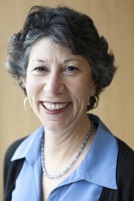
By Marsha Mansfield, Distinguished Clinical Professor of Law, Director of the Economic Justice Institute
Happy spring! (I hope) This is our spring newsletter, so I am taking a positive approach. However, I also have so much to be positive about when I think of all of EJI’s accomplishments over the past few months.
First, I want to introduce you to Ryan Poe-Gavlinski, the new Director of the VOCA Restraining Order Clinic. You may recall learning about this clinic in our last newsletter. Ryan joined us in January and her students are already representing victims of domestic violence at their injunction hearings. Ryan has an extensive advocacy background. She began her legal career with California Legal Aid, and moved to the Public Defender’s Office where she worked until she joined her husband in West Virginia in 2009. She spent several years with Legal Aid of West Virginia, representing victims of domestic violence in civil matters, including divorce, custody, domestic violence protective orders, housing matters, adoptions and child support proceedings. She then worked for the State of Indiana’s Department of Child Services as an attorney with the Fort Wayne office until she found her way to Wisconsin. Ryan, her daughter, and her husband are enjoying all that Madison has to offer, despite its terrible winter.
During the polar vortex, many of you ventured out to join us for a screening of This is Home, a powerful documentary about refugee resettlement in the United States. The movie tracked the lives of four Syrian refugee families trying to reassemble their lives in Baltimore over the course of eight months. We were so gratified by all of the support for this event. The attendance was amazing and made the evening so meaningful. We have a wonderful, engaged Board of Directors who are eager to support the work of our clinics. If you have an interested in becoming more involved with EJI, please reach out to our Board President, Melissa Williams.
We also are very excited about being chosen as a finalist for the “DreamUp WI Challenge” to help 10,000 Dane County households increase their net income by 10% by 2020. This competition, created by Schmidt Futures, a philanthropic initiative, brought together a collaboration of members of the Law School (Mitch of the Neighborhood Law Clinic, Sarah Davis of the Center for Patient Partnerships and myself), Legal Action of Wisconsin, and Employment and Training Association (EATA) of Dane County. Our proposal, LIFT (Legal Interventions For Transforming) Dane, has as its goal, removing barriers to finding and retaining a job through holistic legal checkups that will identify problems with legal solutions; and that will connect those individuals with free legal aid to address their legal problems. You can learn more about this initiative at the DreamUP Wisconsin Showcase. Members of our team will meet with Eric Schmidt in June to make our final pitch for funding to support this innovative effort.
We also are excited to share news about our clinics, our students, and our alumni. So please enjoy the read. As always, we appreciate your financial support of the work that we do. Your gifts allow us to expand and create new opportunities for our students, and every donation helps this happen. Thank you.
Meet the VOCA Restraining Order Clinic
By Ryan Poe-Gavlinski, Director of the VOCA Restraining Order Clinic
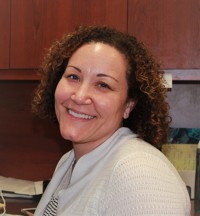
The Victims of Crime Act (VOCA) Restraining Order Clinic began in the spring 2019 semester. We have gotten off to a great start. Currently, there are four students in the Clinic and they have been providing direct legal services to victims/survivors of intimate partner violence that include, interviewing clients, trial preparation, client preparation, and direct representation of clients in injunction/restraining order hearings. We assist clients in Sauk, Jefferson, Rock, and Dane Counties. Practicing in multiple counties truly gives students a broad understanding of litigating cases in different jurisdictions. One of the major benefits of this particular clinic is that given the short statutory timeframes for these cases, students can work with a client from beginning to end and do so multiple times within a semester.
We have initiated relationships with many of our community partners and the courts in each of the counties that we practice. The students really enjoy working directly with clients and have learned so much in a short period appearing in court and learning to think on their feet.
I look forward to growing this program and hope to have more students enroll for the Fall Semester.
EJI in the News & Staff Presentations
- Erin has been extremely busy presenting to the community regarding immigration law and policy. In November, IJC Alum Tatiana Shirasaki and Erin presented “Migrant Children and Protections to Avoid Child Trafficking” and “The Challenges of Immigration Practice in the Trump Era” at the First International Law Symposium at the Harvard Club in New York City. In February, Erin presented “The Challenges of Immigration Practice in the Trump Era”, at Reinhart Boerner Van Deuren in Madison, WI and also did an interview with WPR on “The Status of Reunifying Migrant Families Separated Under ‘Zero-Tolerance Policy’. This past March with IJC Alum, Aissa I. Olivarez, Erin presented ‘A Year of Attacks on Immigrants and the Impact on SAFE” this March, at the Children Youth and Family center in Madison, WI.
- Marsha was honored with the Equal Justice Fund’s Eisenberg Lifetime Achievement Award at their annual dinner in November. Dean Margaret Raymond presented her with the award. March was a busy month for her as well. She joined a panel at the Wisconsin Equal Justice Conference to discuss her findings from a study of outcomes resulting from attorney representation of domestic violence victims in family matters. She also made a presentation about grandparent’s rights and responsibilities to a grandparent support group at the Rainbow Project in Madison. On March 29, she made a presentation about the LIFTDane Dream-Up Initiative to the Law School’s Board of Visitors with Mitch.
- Mitch, in partnership with Prof. Revel Sims, received a research grant to begin a study on the relationship between rental housing quality and evictions in December. He was promoted from Clinical Associate Professor to Clinical Professor in February. In March, he received the U.W. Law School’s Clinical Teacher of the Year award. On March 14-15 he led a workshop for non-profit law firms at the Access to Justice Conference in Salt Lake City. In April he presented at the Town & Gown dinner.
- The Family Court Clinic received the Outstanding Services Award from the ABA Standing Committee on Legal Assistance for Military Personnel (LAMP) for their work on behalf of active duty service members in 2018.
EJI alumni: Where are they now?
By Brian Seidl (2L)

Aaron McKean was a student in the Neighborhood Law Clinic (NLC) from the summer of 2013 through the spring of 2014. He currently works as counsel for the Campaign Legal Center in Washington D.C. He focuses on election law, campaign finance law, voting rights and gerrymandering. In this capacity, he is helping state and local governments or activists write laws that will implement necessary ethics and campaign finance reforms.
Aaron honed many of his skills during the first job, working as a non-partisan drafter with the Wisconsin Legislative Reference Bureau. Aaron drafted the legislation our state senators or assembly members asked for in their proposed bills. This experience gave him unique training and expertise, which he brings to his current assignment.
In recalling his experience at the NLC, Aaron recounted his first hearing, and noted the specific impacted that his time in NLC had on his developing career. His time working in the clinic gave him an understanding of how legislation affects the practical application of law. His time researching laws and seeing their practical application inside a courtroom sets him apart from his colleges in his current role. Whether litigating, writing a complaint, or an appeal, his experience sets him apart from his peers.
Student articles
A Missing Driveway, an "Artful Dodger" and Me
By Steven Beckham (2L)
I chose to take part in the Consumer Law Clinic (CLC) to gain meaningful hands-on experiences. This past summer I discovered how incredibly rewarding it is to help real clients with real problems. My first court hearing was one of the most influential days of my legal education.
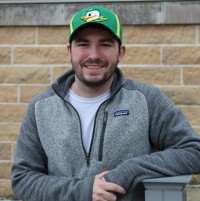
A local contractor (“Mr. S.”) had taken advantage of our elderly clients by not only failing to replace the concrete driveway that he had excavated, but he also replaced a back yard patio with mounds of cement that resembled a giant melting wedding cake.
When my student partner and I began working on the case last summer, the clinic had obtained a money judgment against Mr. S. for the payment he received from our clients and the costs for a second contractor to correctly complete the projects. Our job was to enforce the judgment. The first step was to file a motion for contempt of court because Mr. S. failed to complete a mandatory financial disclosure form. I spent a lot of time working with an investigator and process server to locate Mr. S., who had a well-earned reputation of avoiding the legal system.
The court scheduled the motion for a hearing. I remember being nervous the entire week before the hearing even though I would not personally be presenting anything to the judge. The day before the hearing, I filed the process server’s affidavit that detailed his attempts to serve Mr. S. with court papers. The stakes were high; the judge could issue an arrest warrant for Mr. S. if he failed to appear. The question loomed in our minds: “Will Mr. S. show up?” As we walked down the long hallway to the courtroom, we saw him…the elusive Mr. S.
Despite our surprise that Mr. S. appeared, the hearing went smoothly. My colleague Spencer and I sat at counsel table with Professor Orr. The judge was business-like but friendly, and even took the time to ask how my summer was going at the clinic. At one point, the judge explicitly referred to the affidavit I had filed the day before to question Mr. S. about his true address—a critical disputed fact. I remember thinking that this was the coolest experience of my law school career.
However, we were not finished. Spencer and I filed the garnishment action and waited for the money to pour in from Mr. S.’s employer. Weeks later, the clinic received a meager check. Mr. S. had quit his job, and the check was both the first and last we would receive for our clients. Seemingly a pyrrhic victory. However, while we had hoped to obtain full restitution, our clients were thankful for our work and for the extremely modest amount, we were able to return to them. For me, that small check represents a big moment—my first real experience in the legal profession.
Going to my first court hearing validated my entire clinic experience. I think that experiences like mine are common in the CLC and they make the CLC so valuable.
Intersecting Family and Immigration Law
By Meg Sternitzky (2L) and Kelsey Mullins (2L)
As Family Court Clinic (FCC) students, we typically are focused on Wisconsin’s statutes regarding families. However, Special Immigrant Juvenile Status (SIJS) cases require us to expand our horizons to represent families who are also facing immigration matters.
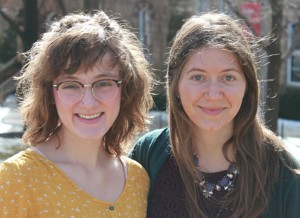
Meg Sternitzky and Kelsey Mullins
SIJS allows undocumented immigrant children to obtain legal status in the United States in cases where they cannot be reunified with one or both parents due to abuse, neglect, or abandonment. Before a child can apply for SIJS before the United States Citizenship and Immigration Services, a state juvenile court must make three factual findings:
- The child has been declared dependent in a juvenile court or legally committed to or placed under the custody of a state agency or department or an individual appointed by the court.
- Reunification with one or both parents is not viable due to abuse, neglect, abandonment, or a similar basis.
- It is not in the child’s best interest to be returned to his or her home country.
Because state courts make the these factual findings, the FCC works with adult clients who are seeking custody and placement or guardianship of a child, so the child can ultimately petition for SIJS.
In custody and placement cases, one parent has been raising the child due to the other parent’s abuse, neglect, or abandonment of the child. The FCC represents the primary parent by petitioning for legal custody and physical placement. In a guardianship case, usually neither parent is able to care for the minor child. The FCC will represent someone other than the child’s parent and draft a petition for guardianship on behalf of that person. Guardianships allow someone other than the minor child’s legal parents to care for the minor child and make decisions for the child. In both these cases, the FCC moves the court for SIJS findings and supports the motion by authoring an affidavit that the client signs to support SIJS findings.
The FCC student also authors a brief in support of the client’s motion for legal custody and physical placement or guardianship, and the SIJS findings. The brief weaves together the petitioner’s factual circumstances with the SIJS law. In Wisconsin, and in particular in rural counties in Wisconsin, this brief is very important because many judges are unfamiliar with SIJS. The FCC is thus tasked with informing and persuading the judge to grant the petitioner’s motion. If the state court grants the petition for legal custody and physical placement or guardianship, then the court has satisfied the first requirement––the child has been placed under the custody of an individual appointed by the court.
In addition to ordering custody and placement or guardianship of the child, the state court must also make the final two findings: (1) reunification with one or both parents is not viable due to abuse, neglect, or abandonment and (2) returning to the home country is not in the child’s best interest. Once a state court has made the three factual findings, the parent, guardian, or child can proceed with the child’s immigration case.
SIJS cases provide FCC students with a variety of avenues for collaboration and exposure to new areas of law. For instance, we have had opportunities to collaborate with immigration attorneys, such as those at the Community Immigration Law Center (CILC), who are working with clients in federal immigration proceedings. Similarly, we have learned about immigration law in order to accurately convey to the judge what his or her role is in making SIJS findings. This intersection of family law and immigration law has provided us with an opportunity to see how legal problems intersect, and SIJS cases have taught us that legal advocacy is a combination of legal education, fact-finding with clients, and persuasive writing.
From Detention to Freedom
By Julia J. Jagow (2L)
I am not exaggerating when I say that my hands were shaking as I entered into immigration court. Even though I knew we had a strong case, I was nervous about speaking in front of the judge; anxious that I would say the wrong thing or somehow forget an important element of our client’s asylum case. Swallowing that nervous energy, my case partner and I walked through the gate partitioning off the gallery and sat down at counsel table. This was it! All our hard work in the Immigrant Justice Clinic over the past few months culminated in this moment.
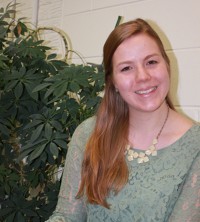
I thought back to the first meeting with our client months ago, at the Dodge County Jail—we were separated from our client by a pane of glass and asked him to put his life, literally, in our hands. In the hands of law students that he did not know and had no reason to trust. Over the next few months we met with our client weekly, learning about the horrors he had faced in his home country, and spent hours upon hours in the IJC office, painting his story on paper as we transcribed his declaration and wrote a brief, arguing that he deserved to be awarded asylum. We built trust in those weekly meetings by laughing together when we could, and by taking his fears, concerns, and questions seriously.
Now, the preparation was over; the case had been filed with the court, our client had been prepped for his direct exam, and we had rehearsed endlessly. It was the last battle and we were ready to fight for our client.
Then, we realized that we had been placed in a different courtroom than our client and that he would be appearing via video. He would be in another room in the building handcuffed and all alone, except for a translator and an ICE agent. I considered, in that moment, how much more nervous he must be about the whole ordeal. We had told him that we would be in the same room, sitting right beside him. We had drawn him a picture of the courtroom. We had told him that we would be listening carefully for discrepancies between what he said, and what the translator translated, ready to object if necessary. We had told him that whenever he felt nervous, he could look at us and we would give him a reassuring smile. We had told him that our supervising attorney would be sitting with us just in case something went wrong. Now, he had no way of knowing if all the promises we had made to him were true because he could not see us at all.
Later, when talking with our client about his hearing experience, he told us that for a minute he thought that we had not shown up! It was not until the camera panned across the room that he saw that we were there, and ready to advocate for him. We did and we won! That day, our client stepped out of the courthouse, onto the streets of Chicago and felt true freedom for the very first time in his life.
This is just one example of the hurdles we must overcome when practicing immigration law. The laws are tricky, we often do not share a language with the clients we work with, and we hear stories of trauma and pain every day. We are here and we are fighting. Because if we don’t, who will?
From Start to Finish
By Brian Seidl (2L)
The opportunity to help people in need of legal services while in law school was a big reason I chose to come to Wisconsin. I knew I wanted to be in the Neighborhood Law Clinic (NLC) before I had even arrived on campus. Walking into the clinic setting after completing my 1L year was a moment I had been looking forward to since the first day of class.
The first few weeks were a whirlwind. The previous students had primed the pump for us, so to speak. The files were organized, but it was still a mountain of work to wrap our heads around the cases before us, turned over during finals a few weeks prior.
Once the dust settled during the first few weeks of orientation, I picked up one file that was just at its starting point. An intake had been completed and a memo drafted. NLC had signed on the client, but the complaint had not been filed yet. This would be my project, my very own, from start to finish.
I took the old draft complaint and re-read the file. As is typical for many of our cases, our client had done some work for a contractor and had not been paid. After trying to handle the situation alone for several months, the client came to see us.
At first, it seemed as though the contractor had disappeared. I set to work, redrafting the complaint. It was a heady experience, being solely responsible for the complaint. After a week, we had a product that clearly articulated the issues, the causes of action, and the remedy sought.
Getting the contractor served was another issue. Our phone calls, emails, and eventually, our demand letter, had received no responses. I enlisted the help of a process server in the rural area and hoped for the best. After a week of no news, I called the server about an update. Out of breath, the server relayed that he had just chased the contractor down and served him with the complaint.
True to form, the contractor never answered the complaint so we obtained a default judgment. Getting our client paid was going to be harder than I had expected however. Luckily, we had an ace in our sleeve. The court made an error in computing damages, and I got the opportunity to practice my writing skills drafting a letter requesting a hearing to correct the error. We hoped that the contractor, after realizing we would greatly increase the default judgment amount, would eventually respond.
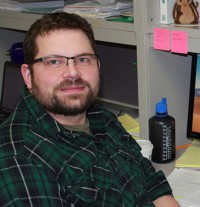
In late fall, I filed the letter and received a date in January for the hearing. Three days after the start of the spring semester, I would appear in court to explain how our client was entitled to additional damages. Going into winter break, I was excited and more than a little nervous.
Three days before the hearing, we returned from winter break. While I started to attend classes, my attention kept wandering back to my impending hearing. There is a saying in the military; “No plan survives first contact.” It means that whatever plan you think you had before starting an event, it goes out the window as soon as you meet the enemy. In my 11 years of service, rarely did I see an event go according to plan. Even though our arguments seemed strong and well supported by case law, I could not shake the idea that something unexpected was going to happen. I read and studied every case that I thought I would need. A yellow legal note pad later, I felt a smidgen better.
The day before the hearing, we had an unexpected surprise. The contractor sent an email agreeing to settle. I drafted up the agreement and stipulation, which was signed at 3:30 AM the following morning. The rest of the saga is anti-climactic. The commissioner arrived 8 minutes late. I introduced myself and told the commissioner we had reached a last minute settlement. The court called the contractor, who had requested to appear by phone, and confirmed the details of the stipulation. He thanked us for settling since he had a busy schedule and it was good to be ahead of time for a change. Then we left. It was over. Amazingly enough, my first hearing went exactly as planned.
The opportunity to go from start to finish on a case has been a big boost of confidence going forward. I have a lot to learn, but I have practiced the practical skills I am going to need for the future. Most importantly, the contractor has finally started making payments, and I was able to deliver a check to my client, he is finally being compensated for the hard work he had completed over a year ago.
